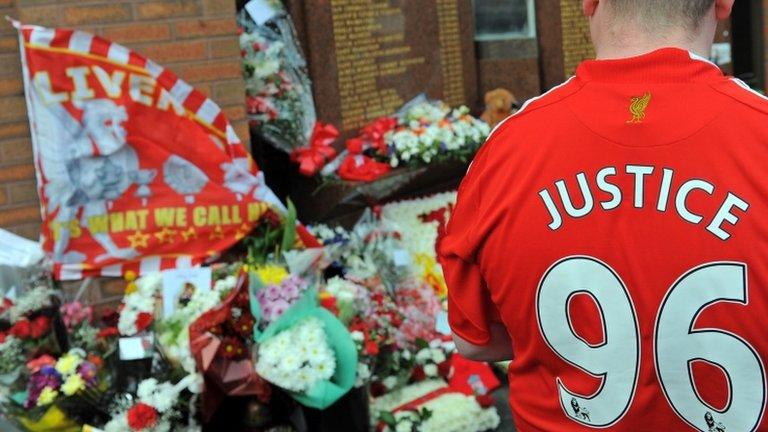Hillsborough and the power of documentary evidence
- Published
- comments
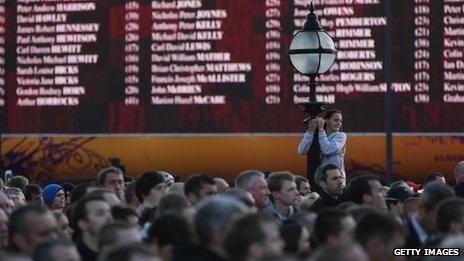
The vast quantity of material released by the Hillsborough Independent Panel, external contains much of the truth - the real truth - about the nation's worst sporting tragedy and its aftermath. In some ways the panel's work and its reception is testament to the power of documentary evidence.
This wasn't a traditional public inquiry aimed at analysing causes, interrogating the views and counter-views of those involved, attaching blame and devising recommendations for the future.
It was simply an attempt to collate all the available evidence and to publish it. I was struck by how, at their press conference, the panel members stressed that this was their role and that they did not seek to make value judgements.
Yet it is clear from the reaction to the panel's report that this did nothing to reduce its impact. Facts, not comment, have caused shock and outrage, headlines and apologies.
The panel and its research and archiving staff have certainly done an impressive job of organising, cataloguing, presenting, contextualising and summarising a huge amount of paperwork. The excellent Guardian Datablog has an interesting overview of the material released, external.
Of course documents by themselves can never provide the full truth about a complex set of events. That would always need to take in individual recollections, the direct accounts of those involved, and the chance for those criticised to provide their version of events.
But when there are well-founded suspicions of a cover-up by the authorities, the pure disclosure of the raw information can be the crucial remedy. This is the key point appreciated by Andy Burnham when, as a cabinet minister, he persuaded the Labour government to establish the panel in 2009.
And as regular readers of this blog will know, the BBC pursued a freedom of information request about the tragedy from the time before the panel was established.
Perhaps this is a model that may be adapted to other controversies. It suits an era where we have the technology of the internet and the political force of the notion of transparency.
Driven by their distress over cover-ups and misinformation, the bereaved families have long demanded complete disclosure of all relevant documents. Has this total disclosure been achieved?
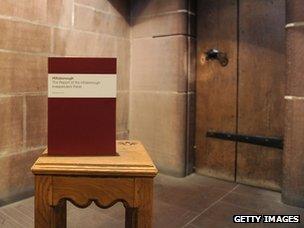
In 2009, Labour waived the 30-year rule for disclosing public documents relating to the disaster
As conscientiously recorded by the panel, external, it decided not to publish - despite the wishes of most of the bereaved families - some "very sensitive personal data". This was "out of respect for those who died" and is of course entirely understandable.
It redacted some personal information about others where disclosure would not "add to public understanding".
The panel also encountered insuperable legal obstacles to obtaining some material held by Liverpool Law Society on behalf of local solicitors who had represented the bereaved and survivors in various proceedings.
But there is no evidence that any part of the state has held anything back from the panel.
Although papers revealing the views of government ministers were originally excluded from the panel's terms of reference, this constraint was abandoned and they do feature in the files released.
In fact, the thoroughness of disclosure is such that they even include extracts from the cabinet secretary's notebook recording discussions at cabinet meetings. Unlike the official minutes, this notes the different views of individual ministers. In the past, the notebooks have been kept secret - as noted by the National Archives, external - for longer than the standard 30-year rule which applies to the official record of the meetings.
It is possible to compare the handwritten notes taken by the cabinet secretary Sir Robin Butler, external at the cabinet meeting in the wake of the Hillsborough tragedy with the official minutes, external.
The one organisation criticised by the panel, external for not fully co-operating and supplying all the information it could is a private - not public - body.
This is the Royal Sun Alliance insurance company, which at the time of the disaster in 1989 insured Sheffield Wednesday, the club that owns the Hillsborough ground. The panel report draws attention to numerous safety defects at the venue.
The insurance company refused to give the panel confidential access to its legally privileged information, despite the panel's "strenuous efforts" to persuade the company to comply.
A company spokesperson told me: "The panel's terms of reference related to the disclosure of documents held by public bodies and did not apply to any of the private bodies involved. However, we willingly co-operated with the panel, disclosing all relevant materials in our possession. It is not our practice to release legally privileged materials."
Under the Freedom of Information Act, public authorities can be forced to disclose legal advice and other legally privileged documents when this would be in the public interest.
There is no similar legal provision for the private sector.
- Published26 April 2016
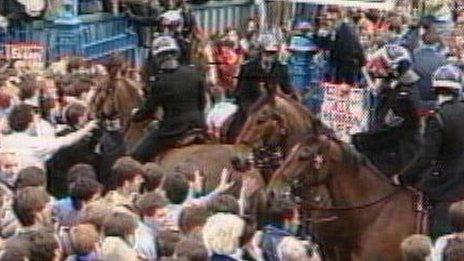
- Published13 September 2012
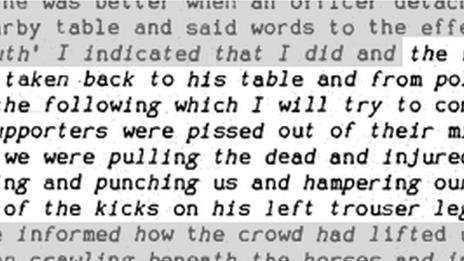
- Published12 September 2012
